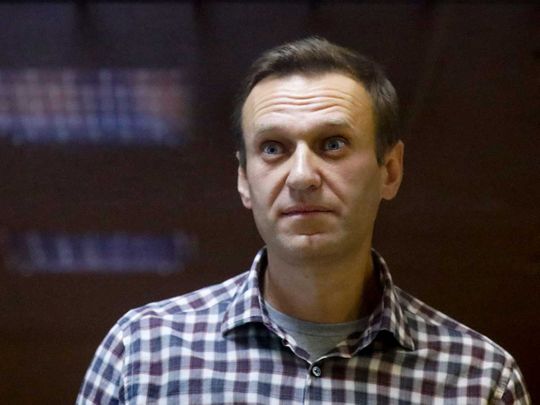
Moscow: Russia’s prison service said Monday that hunger-striking Kremlin critic Alexei Navalny would be transferred to a hospital for inmates, but deemed his condition to be “satisfactory”.
The prominent opposition leader announced the protest three weeks ago in an bid to receive proper medical attention as his health deteriorated in a prison colony outside Moscow.
He was thrown behind bars in February for more than two years on old embezzlement charges, just weeks after he returned to Moscow from Germany where he had been recuperating from a near-fatal poisoning attack.
The prison service said in a statement that a group of doctors had “made a decision to transfer A. Navalny to hospital for convicts located on the territory of Penal Colony No 3.”
“At present, A. Navalny’s medical condition is deemed to be satisfactory; he is being examined by a general practitioner every day,” the statement added.
The 44-year-old anti-corruption campaigner was sentenced earlier this year to serve out his sentence in Penal Colony No 2 outside the Russian capital and soon after began complaining of back pain and numbness in his limbs.
On March 31, Navalny announced a hunger strike to demand proper medical treatment and his allies said the prison authorities have threatened to begin force feeding him.
The prison service said in its statement that with Navalny’s consent, “he was prescribed vitamin treatment.”
Western countries have urged Russia to provide Navalny with proper medical care and to release the Kremlin critic, and warned against possible repercussions.
EU foreign policy chief Josep Borrell said Monday the bloc holds Russia “responsible” for Navalny’s health as EU foreign ministers held virtual talks on soaring tensions with Moscow.
Navalny timeline: From poisoning to hunger strike
Coma
The 44-year-old anti-corruption campaigner is hospitalised on August 20, 2020 in Omsk, Siberia, after losing consciousness during a flight. Put into a medically induced coma, he is transferred two days later to a Berlin hospital at his family’s request.
Novichok
Berlin says on September 2 that tests carried out by a German army laboratory yielded “unequivocal evidence” that he was poisoned with Novichok, a Soviet-era chemical weapon.
Kremlin denial
Two days later the Kremlin rejects claims it was behind the poisoning. On September 7, Navalny emerges from the coma.
Labs confirm poisoning
French and Swedish laboratories confirm Germany’s findings that Novichok was used. Putin condemns “unsubstantiated” accusations.
Putin accused
Navalny accuses Putin of being behind his poisoning after he is discharged from hospital on September 22. Putin’s spokesman Dmitry Peskov calls his claims “groundless and unacceptable”.
Spooks stung
Navalny releases a recording in October of him tricking a Russian Federal Security Service (FSB) agent into confessing that he tried to kill him. The FSB describes the phone call as a “provocation”.
Defiant return
Navalny says he plans to return home despite a threat of jail. He is detained on January 17 shortly after landing in Moscow.
‘Putin’s palace’
Navalny releases a video of his investigation into a lavish Black Sea property he claims is owned by Putin. It goes viral as Putin denies it is his. The authorities round up Navalny’s allies.
Protests and prison
In late January tens of thousands of demonstrators demand Navalny’s release. Police detain thousands. On February 2 Navalny is handed a near three-year prison term.
Diplomatic crisis
On February 5, the Kremlin expels German, Swedish and Polish diplomats for supporting Navalny. The three countries expel Russian diplomats in return.
Rights court weighs in
The European Court of Human Rights orders Russia to release Navalny “with immediate effect” on February 17. Russia accuses it of “interference”.
Appeal denied
Three days later a Moscow court dismisses Navalny’s appeal, but reduces the sentence to two-and-a-half years. Separately he is convicted of defamation and fined 850,000 rubles (around 9,500 euros). The EU on February 22 sanctions four senior Russian officials.
Penal colony
On February 26 Navalny is sent to a penal colony. Authorities say he is in the Vladimir region some 200 kilometres east of Moscow. Washington on March 2 sanctions seven senior Russians and says its intelligence concluded that Moscow was behind Navalny’s poisoning. Navalny says on March 15 he is locked up in a “real concentration camp” and accuses Russian authorities of torture by depriving him of sleep in prison.
Hunger strike
On March 31, Navalny announces a hunger strike to demand proper medical treatment. After more than two weeks his doctors say his condition has rapidly deteriorated and he could go into cardiac arrest and “die any minute”.
On April 18 the US warns Moscow of “consequences” if Navalny dies in prison.
France, Germany and the European Union join the growing international chorus of protest at Navalny’s plight. On Monday Russia’s prison service says Navalny will be transferred to a hospital for inmates but deems his condition to be “satisfactory”. A massive demonstrations in support of Navalny is planned Wednesday evening, just hours after Putin gives his state of the nation address.








